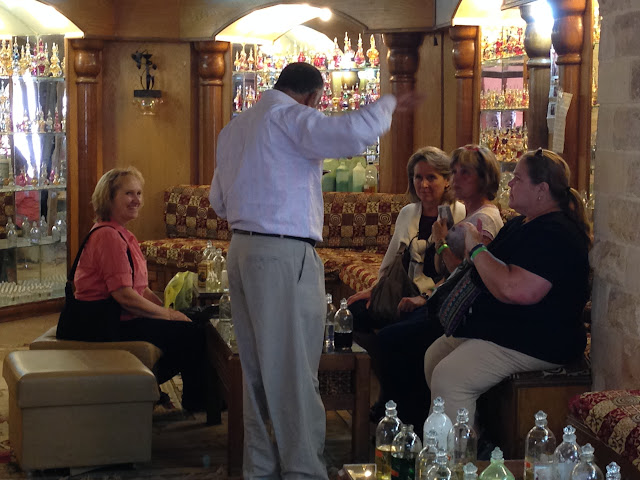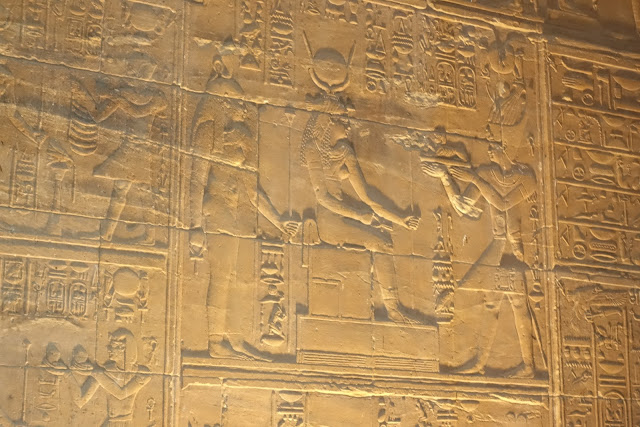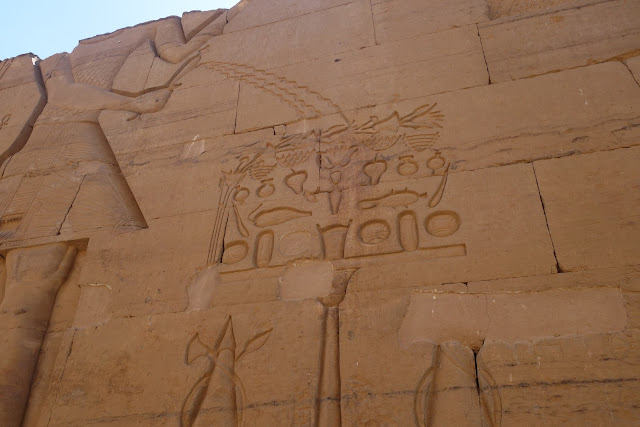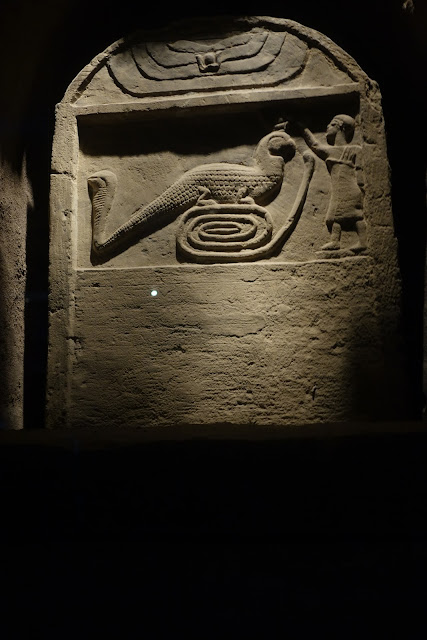We are now in Egypt, a completely different country in so many ways.
I love Egypt.
We had a few hours our first morning and headed into town.
We quickly learned Egypt is suffering greatly from a lack of tourism due to fear of troubling violence. Indeed, the question I was asked most by people who heard where we were going was "Aren't you afraid?" My (limited) travel experience has taught me that countries are full of friendly people, happy you're visiting, happy you are spending money. I never felt unsafe in Egypt, and found the people to be warm and friendly.
"Town" was actually an outdoor mall, completely devoid of tourists.
Just inside the mall was a mock-up Bedouin camp.
The owner quickly commandeered us, inviting us to experience Bedouin life.
All of the men in our group had taken a side trip to Mt Sinai. Except Stan. His wife vetoed the idea, knowing Stan's RA makes climbing very difficult and causes crippling soreness for days after.
Lucky Stan.
He got to be Chief Bedouin Guy.
Which made me Chiefess.
We discovered Egyptians are really, REALLY into Hookahs, which they call shisha. We would see them everywhere. However, we are not into smoking of any kind,
nor are we into harems, so we slipped a few dollars into our host's hand and skedaddled.
This shopping center was overflowing with all kinds of wonderful products, like this magic, wash the fat away soap. If only....
We stopped at this interesting perfume shop, with all kinds of scents made by the owner.
The proprietor promised his perfume would leave us smelling like a lotus flower for days, through bathes, showers, and rainstorms. I purchased a bottle. After applying, I could smell it for 10 minutes. Maybe. Maybe more like 7 minutes.
We were literally the only tourists in town that day. It was not unusual to have a guy help us in one store, then follow us to the next store where he would help us again. This is a place that has seen better times.
We were staying in the Sofitel Hotel.
The view from our room was impressive.
Inside court of our hotel.
I'm just not impressed with a lot of the Egyptian scenery yet.
We took a little trip on a tiny little plane to Aswan.
Even though our flight was short, we got cookies and juice, more than I've gotten on an American flight in years.
In Aswan, we were boarding the ship for the river cruise part of our journey.
After a quick stop to at our room,
we headed to our first site. Egypt is a country of poverty.
Egypt is home to many churches. As our guide said, "No one here asks which church you belong to." Here, you can see the tower of a mosque in the background.
This is the Archangel Michael's Coptic Church, home to 10% of Egyptians. I'm not sure how they came up with the 10% since no one in Egypt asks what church you belong to....
Through the bus window.
Our first stop today is going to Philae Temple, on Agilkia Island.
Egypt is a country dependent on tourists, and since there are currently few tourists, we were very popular everywhere we went. Our guide invited some Nubian sellers on board, which was actually very nice--we didn't have to endure being chased down by aggressive salesmen, or worse, irresistible children, and these wares were quite appealing.
Philae Temple has an interesting history. It used to be on a different island, close to the center of Aswan, but flooding became an issue due to a dam built around 1902. There were soon serious concerns the ancient temple would be lost forever.
UNESCO decided to move the temple to a better location, and in the 1970's Philae was successfully moved to its currently location.
The oldest part of Philae is a temple to Isis, built around 370 BC. Yep, that's BC. That's even older than I am!
There were expansions by rulers from 285 BC to 305 AD.
The temples were closed by order of Emperor Justinian 535 AD. Some areas were converted for worship by Christians, and later, in the 17th and 18th century, Philae became a popular tourist destination.
This temple was built by the Greeks.
This is my first experience seeing hieroglyphics and ancient Greek temples, and I was duly impressed.
There were a few places like this: varying ceiling heights and doorways, depicting eternal life.
Note the different colored stone at the bottom--our guide said this is from the constant flooding.
Not much to say about a lot of these pictures, other than they were amazing, stunning, incredible, beautiful, awe-inspiring.....
This fella used to be a lion, guarding the entrance to the temple.
There were a series of columns with faces on them, each face happier than the one before it.
The faces are a depiction of Hathor, wife of Horus. She's afraid the temple will not be finished, and smiles as it is.
Apparently, graffiti was an irresistible temptation, even in the 1800's.
Even the ceilings were covered in hieroglyphics.
The seated figure in these hieroglyphics is always the king, or in this case, queen.
We had this whisper sets so we could hear our tour guide. They were marvelous.
More vanishing point doorways, symbolizing of slipping into eternity life.
Beautiful view of the Nile.
This day was so hot. Standing amidst all this stone was super hot.
I know this is picture overload, but I there was so much to see here.
Our next stop was the Kom Ombo temple, built in during the Graeco-Roman Era, 332 BC - 395 AD.
It is actually two temples, one dedicated to Sobek, the crocodile god, and the other to Horus, the falcon-headed god.
People of the day feared the crocodile, and believed if they worshipped them, the crocodile would not attack them.
That's Sobek on the left with the croc head.
There is still color in many hieroglyphics here.
Much of this temple has been destroyed by the Nile, earthquakes, and builders who borrowed pieces from this temple.
These people not only kept crocodiles captive within the temple, but also mummified them.
At one point in history, Coptics took over the temple. They were known to deface reliefs they didn't like.
This was our Egyptian tour guide. He was a bit of a character. His English pronunciation skills were good, but he often had a unique way of expressing himself. One day on the bus, I wrote down word for word some of the phrases he used, misused, and overused.
"Please do not let the chance to miss you" (Don't miss this)
"Can you imagine? As if painted yesterday." (Referring to ancient painted temples, artifacts, etc.)
"I am going to explain to be more clear." (That didn't always happen.)
"I'm telling again, nothing for free." (Heard this a lot, not sure what that means.)
"Why is that?" (His favorite question. He asked it every other sentence.)
He kind of grew on me.
We found that every temple, modern or ancient, had a Holy of Holies. The rock altar you see here is in this temple's Holy of Holies.
When we went into these places, there were always men lurking to grab you if you wandered from the crowd so that they could give you a tour of a spot (for a small fee) "no one else was allowed to see".
One of the things this temple is famous for is this depiction of medical instruments
and this woman giving birth. Careful! You're dropping that poor baby on a cold, hard, stone floor!
The ancients joined to slabs like this, using wet wood in this curved indent that would pull the stone together as the wood dried.
Our final stop of the day was The Crocodile Museum.
There were between 300 and 350 mummified crocodiles found in the cemeteries of Kom Ombo. They look surprisingly like regular crocodiles, ready to come take a bite out of you.
There are also several stelae in the museum, stone slabs craved with the images of gods, used in temples or cemeteries.
Crocodiles were worshipped for a number of reasons, including their fertility.
Unwrapped mummy crocodiles. Seems like a lot of work for these pests.
All of this crocodile worship seems odd to me, but the Nile was such an important part of Egypt, and the ancient Nile was teaming with crocodiles who were fond of feeding on Egyptians. Making a god-crocodile ensured safety for the worshippers.
The lower part of this stela includes a prayer, asking for favor and protection.
I think the Egyptians copied this character from a Disney cartoon.
At the end of the day, we returned to our yacht/ship/boat
and sailed the Nile.
The Nile, people! The Nile! Somebody pinch me.
We were warned that Egypt is a "don't drink the water" country, which also excluded most fresh fruits and vegetables.
That was harder than I thought.
By the end of our journey, I was dreaming every night about eating a banquet of lettuce.
After dinner we headed back out.
We were about to travel in the local tourist mode.
The poor horses were so underfed, it was painful to look at them.
We rode two, three, or four to a cart, not including the driver.
Along the streets of Egypt are this places to smoke shisha. There were also a large variety of creative vehicles, and an abundance of motorcycles.
There was an endless variety of dressing styles: lots of long black or brown dresses for men and women, various religious dress, and plenty of western wear.
We often saw, and sometimes had, drivers that were still clearly in their teens.
Our destination was Edfu Temple. It was also dedicated to the falcon god Horus, and was built between 237-57 BC. It's very well preserved. HOWEVER, we were there for a light show.
We really didn't get to see the temple because of the presentation.
We were seated in an area while several overly-dramatic voices told an overly-dramatic story, while various colored lights flashed on and off. It was not good.
This would have been an interesting place to see in the daylight, with a guide.
Just not my thing.
The story had us moving around the building.
Honestly, after awhile, I just stopped listening to the "story" and took pictures.
Reading up on this temple later, I discovered it was covered by sand over time, up to a depth of 39 feet. Homes were built over the top of it, and only the very tallest parts of the temple were visible when in 1798, a French expedition identified it.
French Egyptologists started unburying it in 1860.
On the way back to the ship we passed the Almost Kentucky Fried Chicken place,
and lots of kids up pretty late playing in an enclosed outdoor gym.
Back on ship, I marvelled at the constantly changing scenery outside our cabin.
Our intrepid captains. Don't they look excited?
Sorry about all the pictures. Trying to chose my favorites is like
trying to pick my favorite child.








































































































































































